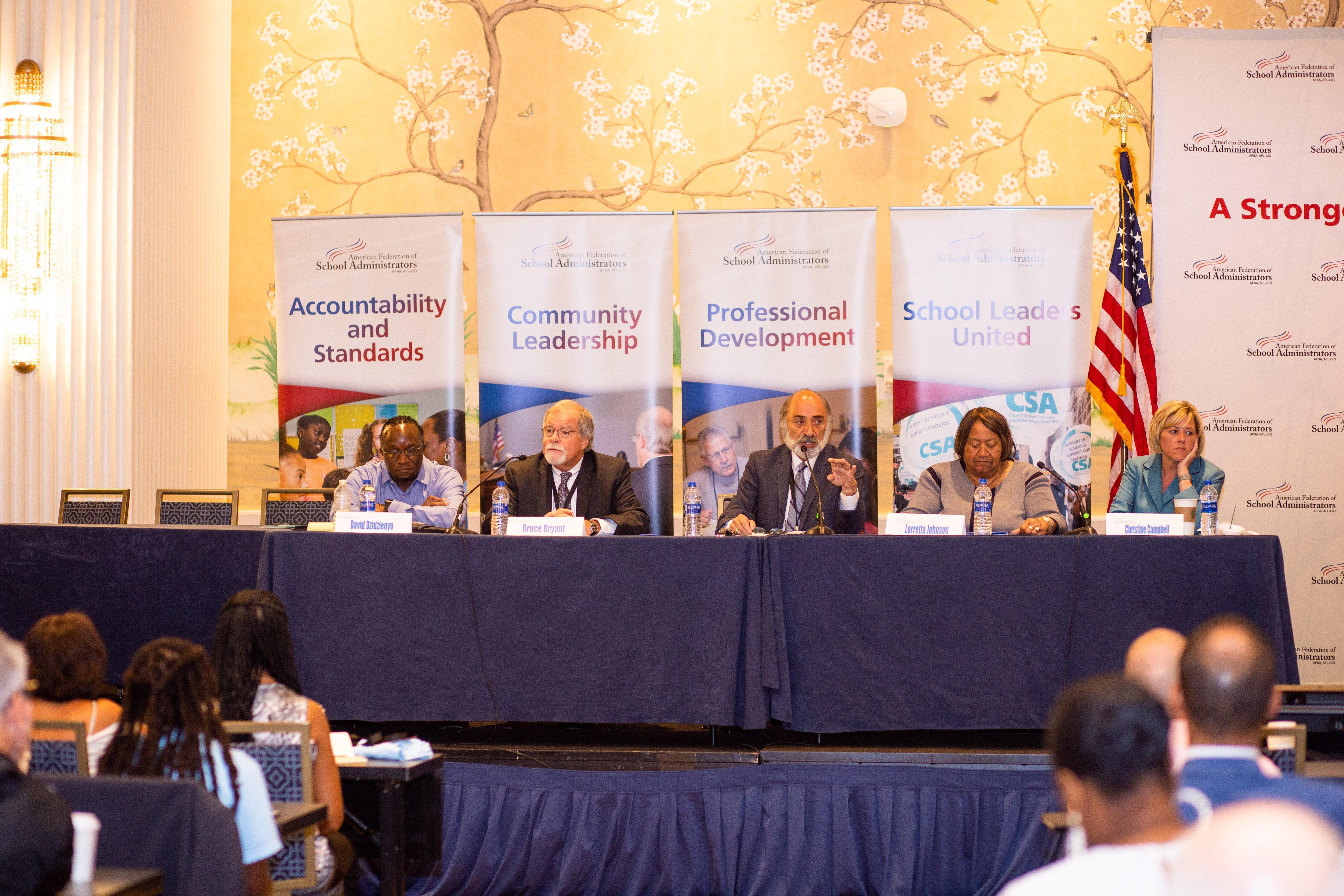During a morning plenary session of AFSA’s Triennial Convention Saturday, AFSA Secretary-Treasurer Dr. Leonard Pugliese facilitated a panel of leading labor union activists who addressed the significant challenges facing the Labor Movement in the face of the extreme right wing assault on members’ rights.
Participating in the panel were Lorretta Johnson, Secretary-Treasurer of the American Federation of Teachers (AFT), Christine Campbell, President of AFT-West Virginia, David Dzidzienyo, Legislative/Political Director of the Metropolitan Washington Central Labor Council, and AFSA General Counsel Bruce Bryant.
Secretary-Treasurer Pugliese initiated discussion by asserting that collective action really comes down to “each one of us, and our willingness to use their capacity for working people all across the country.” He also said that “unless we take the Janus decision seriously, there’s a chance we could become extinct.”
AFSA General Counsel Bruce Bryant addressed the Supreme Court’s decision in Janus vs AFSCME. “We have to get ready for the aftermath of Janus,” he explained. The Janus case was based on the First Amendment of the Constitution, asserting that requiring workers to pay a fee for representation by a union that they do not support violates their right to free speech.
“The Supreme Court’s decision reversed a 40-year precedent,” Bryant explained. “The only way this decision can be reversed is by legislation in your states or in Congress.” The decision only affects public employees, and there are 23 states in which agency fees have existed.
Despite the fact that some members do not choose to pay union dues, unions nonetheless have a duty under Janus – as they did before the decision – to represent all employees fairly in the bargaining unit. “They have to treat a non member like a member,” he explained, in matters covered by their contract.
Since the Janus decision, any agency fee money received was “illegally collected and subject to be returned,” Bryant said, and counseled delegates to escrow money that may now be deemed to have been collected ‘illegally.’ Non-members, however, have no right to vote in union matters as a result of the decision.
Totally foreswearing non-members, he counseled, is not advisable. “You need to recruit new members and have a plan to hold on to the members you have.”
Lorretta Johnson offered that in the aftermath of the Janus decision unions remain strong, citing the West Virginia strike and the considerable strength reflected in other venues, such as Oklahoma. She cited a situation in New York where 238 new members signed up in their local the day after the Janus decision.
“You have to engage membership; Janus forced us to do what we stopped doing: engage members! And we certainly have the issues now with Betsy DeVos [serving as Secretary of Education].” She cited Baltimore, where teachers are going door to door to talk with parents and to recruit their children to enroll in public schools.
“Our members are fired up. And they’re fired up to vote in November.” She noted that AFT has nearly 300 members who are running for public offices in November.
“Being a member-engaged union is the way to go,” she concluded.
Christine Campbell, who led the teachers’ strike in West Virginia, was given a standing ovation by the delegates following a video that characterized their victory.
She explained that her union is doing well without collective bargaining, as they have built a super majority of teachers in her state. Their benefits, she further explained, are legislated at the state level.
“A major factor was the social media piece, which was huge because we could get information out there. But our structure in a state where relationships are very intimate was what really made the difference,” she explained.
Because of this intimacy, she said, the state legislators understands that if they treat us like “servants to the peasants, we will take you out!” As evidence, she noted, “Our superintendants and principals were on the picket line with us.”
“You know that when you work with your teachers and with your communities,” Ms. Campbell told the delegates, “you know your schools thrive.”
David Dzidzienyo suggested that what has struck him most in his community work is how many union members are not registered to vote, “So we need to look at ourselves and figure out how we’re going to do to change that.”
“We need to put out there things that we do on behalf of the community to bridge the gap between labor and the community,” he said, “so that people understand that it’s just not all about labor. It gives the residents better insights into how labor is benefiting them.”
“With Janus,” he continued, “we have a prime opportunity to do the grunt work of communicating more effectively with members to make [being a member] a more inclusive process.”
Bruce Bryant summarized what had been offered by the panel by recounting something that was regularly repeated in New Orleans: “When life gives us lemons, make whiskey sours.”

